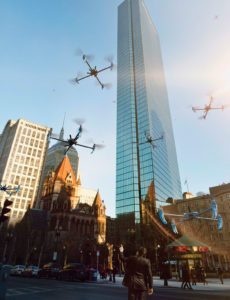 Massachusetts State Police announced Saturday that they will launch a drone education program to teach recreational drone operators the rules of flight.
Massachusetts State Police announced Saturday that they will launch a drone education program to teach recreational drone operators the rules of flight.
The program was announced as a response to reports by two commercial flight crews flying into Logan International Airport that they saw drones in their flight paths on Christmas and New Year’s Day as they approached their runway. While the pilots said the drones were uncomfortably close, both flights landed safely.
“Drones or UAVs are welcome into the air space along with all the other aircraft. We all just need to follow the rules that the FAA sets out,” Mark Estabrook, a pilot flying out of Fitchburg regional airport, told the Boston Globe. “I think we can all share air space safely.”
State Police spokesman David Procopio says that the public awareness and drone education campaign will use social media, broadcast media, and print materials to inform hobbyists of altitude limitations and federal regulations, which state that recreational drones should not be flown over 400 feet in altitude or within 5 miles of an airport. The recent JetBlue flight crew report states that they sited a drone flying at about 700 feet around a mile from the airport, Procopio said.
Another drone was reported by a Canadian Express flight crew on Christmas Day at about 800 feet altitude, near the Madonna Shrine in East Boston which is about 2 miles from Logan Airport.
While both reports have been investigated by the State Police and the FAA, there has been no report of the operators of the rogue drones being identified or penalized.
The Mass DOT published a statement on December 21 in advance of the holiday reminding drone operators to register drones and follow the rules. “Recreational drones can be a fun and innovative way to experience aviation. However, operators must keep in mind that drones can cause serious damage if not handled properly or if they are flown in inappropriate areas,” said Dr. Jeff DeCarlo, Administrator of MassDOT’s Aeronautics Division. “If an operator loses control of a drone, or if a drone experiences a mechanical issue, it can cause serious injuries or damage to other aircraft or property.”

Miriam McNabb is the Editor-in-Chief of DRONELIFE and CEO of JobForDrones, a professional drone services marketplace, and a fascinated observer of the emerging drone industry and the regulatory environment for drones. Miriam has penned over 3,000 articles focused on the commercial drone space and is an international speaker and recognized figure in the industry. Miriam has a degree from the University of Chicago and over 20 years of experience in high tech sales and marketing for new technologies.
For drone industry consulting or writing, Email Miriam.
TWITTER:@spaldingbarker
Subscribe to DroneLife here.







Leave a Reply